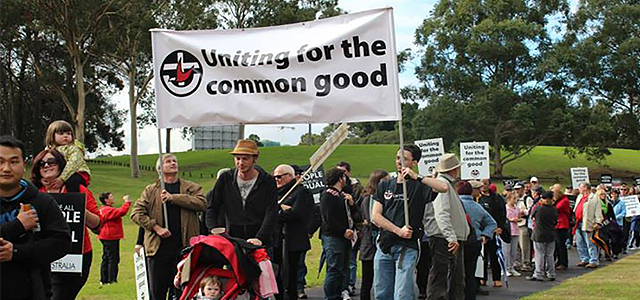During the mid-1990s, I worked as an outreach worker in a small church-based charity in the inner city of Sydney. At the same time, I spent every spare moment in the Mitchell Library in Sydney working on an Honours thesis. among other things relating to Australia’s political history, I was researching how this great nation came to be known as “The Commonwealth of Australia”.
This situation created some significant contrasts. By day, I was faced with harrowing stories of homelessness and addiction. By night, I read about our founding fathers’ inspiring hopes for the nation. And while many of their hopes had become our nation’s reality, it was clear to me from my work by day there was still so much more to be done.
Through my research, I learned the origin of the term “Commonwealth” can be found in the phrase “the Common Good”. The phrase comes from the ancient Greek words symphero (“to gather” or “to unite”), and koinos (“the common, mutual, and public”). It’s an idea we share in our Synod’s mission statement — we are “Uniting for the Common Good”.
Like the solid foundations of our great country, today our mission of “Uniting for the Common Good” captures our Church’s purpose and place in the Australian community. It echoes St Paul’s words in describing a vision of the early church that works for the good of the whole: “Now to each one the manifestation of the Spirit is given for the common good” (1 Corinthians 12:7).
Yet I wonder if we have really stopped to think what it means to be people of the Common Good. And with the many social challenges still before us, I wonder if we truly know how we will achieve it?
We need to work together
It is clear to me we must work in partnership with our communities. We will do this because it has always been how we have worked as a Church; reflecting a belief that we are part of God’s mission and must be in the world working with all God’s people, people of all creeds or none. But we must also be committed to working collaboratively together — as the various parts of the Uniting Church. While we have fewer resources and problems have become more complex, creative solutions will always be found by bringing together diverse groups of people.
This is a big change for a Church that has historically been large enough for its various parts to work independently of each other. This will not cut it in the future. Where we could once talk theologically and in principle about interdependence, now our very survival is dependent on our ability to live this out.
Act local
The future of local Congregational mission will be increasingly found in leading and organising local communities in areas of local concern and public policy. It likely will be as agents of change and less as service delivery bodies.
In recent times we’ve seen some great examples of this through the Community Organising agenda of Sydney Alliance and through workshops with Rich Harwood.
This new way of working will require new forms of shared governance, local cooperation, communication and a belief that our future is in working together, not in creating our own empires.
Imagine what we could achieve, for example, if we work towards common objectives, mobilising our 20,000 church attendees and Uniting’s 9,000 staff and 3,000 volunteers?
A different lead
All of this has implications for our leaders. We need to develop new types of ministry leaders who are outward-focused and able to collaborate with others, particularly with those who are culturally, socially or ideologically different to those we have typically found in our pews on a Sunday. Working with difference can be difficult and getting something done is even more challenging, but our communities need people who can span boundaries, to break the traditional impasses in our society and politics.
“Uniting for the Common Good” is a powerful vision for our Church and community. We need to recalibrate how we work as a church to ensure we make it a reality.
Doug Taylor is the Director of Strategic Engagement at Uniting














